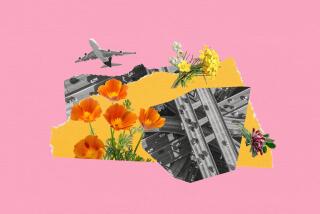Seeding the future
- Share via
AL NODAL is making it clear that Farmlab is not your father’s ecological organization. The executive director of the think tank and civic-minded environmental art exhibition and cultural space in downtown L.A. says that, in the past, environmentalists weren’t able to convey their concerns in a way that resonated with the population at large. By contrast, today, “artists, creative people and environmentalists are coming together to capture the imagination of the world for environmental change.”
Officially launched Dec. 12, Farmlab began as a temporary sounding board for green, community-oriented artistic initiatives. It has since taken root and grown into a fertile launching pad for such projects, as well as an arts hub for weekly salons, eco-themed art shows, workshops and music events.
Located in the desolate industrial area surrounding and beneath the Spring Street Bridge, not far from Chinatown, Farmlab is truly off the beaten path. Its entrance faces a swath of public parkland known colloquially as the Cornfield. In spring 2005, Farmlab founder, creative director and project artist Lauren Bon and her team temporarily appropriated about 32 acres of the barren land. There, they planted nearly 1 million corn seeds, which yielded the community environmental art project “Not a Cornfield” (its name a nod to Surrealist artist Rene Magritte’s “This Is Not a Pipe”).
The living cornstalk sculpture ultimately became the site where two Native American Indian tribes healed a centuries-old ethnic war, and where other Angelenos enjoyed their own outdoor musical and cinematic pow-wows. All of this intentionally took place over one agricultural cycle. “Artists have a lot in common with nature and these cycles because they’re creating something and breaking it down at the end of the season,” explains Bon, whose position as a trustee of the Annenberg Foundation (her grandfather was Walter Annenberg) helped secure the funding for “Not a Cornfield” and Farmlab.
And so it is that the only things left from “Cornfield” are hydro-seeded perennials and an odd circular formation of cornstalks that recalls something out of “The X-Files.” The latter, a sort of monument to the project, is titled “Cornhenge.”
“Not a Cornfield” may have lasted only one agricultural cycle, but its executors’ ideas continued to bear fruit. Bon, Nodal and the team decided to plant something new: Farmlab. Like their own green-themed version of the downtown renaissance, they appropriated and reinvigorated not only the industrial buildings across from the Cornfield, but also the area beneath the Spring Street Bridge, which they dubbed Under Spring. The latter, an unlikely gallery and performance space, was once a heroin shooting gallery.
“Under Spring was full of drug addiction, prostitution and violence,” says Nodal, the former general manager of the city’s Department of Cultural Affairs. “We’ve converted it into an open space for the community where people feel safe.” And it’s where the occasional free performance takes place, including acts such as guitarist-composer Nels Cline and butoh dancer Oguri.
The reinvention of the area under the bridge is only part of the Farmlab effect. The organization’s community outreach efforts include the “AgBins on Skid Row” program, which saw the group disseminating containers of growing vegetables and flowers to shelters and other agencies, so that the homeless could care for the plants. And during a needle exchange program for drug addicts, Bon recalls, “people coming to exchange needles started gardening.”
In short, Farmlab seeks to transform the decaying and everyday urban into a garden of earthly delights. Its inaugural show, “Garden of Brokenness,” consists of an installation that includes an indoor pond and a car with live foliage growing out of its extremities, created by the Farmlab team. It visually describes the setting at the Los Angeles River adjacent to Confluence Park and envisions a rehabilitation of the space through a mixture of found objects and nature, giving it the appearance of a cross between an antique store and a verdant retreat. “Garden of Brokenness” is indicative of the regional scope Farmlab has taken -- focusing most ardently on the L.A. River in its revitalizing art projects.
Farmlab has also been hosting Friday salons around lunch hour in one of its warehouse spaces bordering the local waterway, drawing the curious to discuss environmental issues with artists and agricultural experts such as Matthew Moore and Steve Rowell over free tamales.
One regular, Koreatown resident Veronica Juregui, enjoys the salons because they “bring the farm to the city.” In a typical salon, slides are shown, hands are raised and voices attempt to express ideas on ecologically relevant issues, above the din of the horn of a Metroliner zooming by -- a reminder of the coexistence of nature and fast-track city life.
--
Farmlab
What: “Garden of Brokenness” exhibit
Where: 1745 N. Spring St., Unit 4, L.A.
When: 10 a.m. to 5 p.m. Tuesdays to Saturdays, through Oct. 31
Price: Free
Info: (323) 226-1158, www.farmlab.org
Also
What: “Thirst” documentary screening and discussion with filmmaker Deborah Kaufman
When: noon Friday
Price: Free
More to Read
The biggest entertainment stories
Get our big stories about Hollywood, film, television, music, arts, culture and more right in your inbox as soon as they publish.
You may occasionally receive promotional content from the Los Angeles Times.










